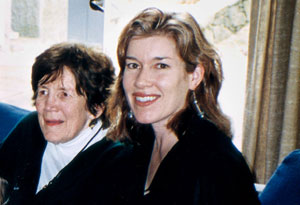O Excerpt: Imperfect Endings

Photo: Courtesy of Zoe FitzGerald Carter
Should Zoe Fitzgerald Carter and her family stand by as their mother commits suicide?
A daughter's tale of the agonizing decision between life and death.
January
I don't have to answer the phone. On my knees in the bathroom, my daughters just settled into the tub, I have the perfect excuse to ignore it. Let the machine pick it up instead. But I head for the door, reminding Lane and Clara—who at 4 and 8 are hardly at risk for drowning—to keep the water in the tub and hold off on the shampoo.
Shading my eyes from the blinding late-day sun, I cross the bedroom, glancing out at the glimmering strip of the San Francisco Bay and, just beyond it, the hazy outline of the Golden Gate Bridge. Four years on the West Coast and this view of water and sky still thrills me.
I pick up the phone, annoyed with myself for answering it.
It's my mother.
"Oh, there you are! Have I caught you at a bad time?" Her voice sounds cheerful and a little excited, as if she has good news. "I was just looking at my calendar and wondering if you could come to D.C. the first weekend of February."
"I'm not sure. I'll have to check. What's up?" I drop onto the bed, heart beginning to clamor. I know what's up.
"Well gosh, honey, I've been trying to find a good time to end things as you know, and I was hoping that weekend might work for you. I haven't called your sisters yet, but of course I want them here, too. And your girls if you can bring them. I'm still working out the details, but—"
"Jesus, Momma," I hiss, cupping my hand over my mouth so Clara and Lane can't hear me. "You make it sound like a family reunion!"
"Well, there's no reason to get huffy, Zoe," she says. "I can't plan anything unless I know you girls are available. Can you just peek at your calendar?"
"No, I can't! I'm in the middle of giving my kids a bath, I don't have my calendar, and I can't think about this now."
"Fine." Her irritation is palpable and for a moment there is silence. "So when can you call me back?" _
I want to say never. I will never call her back if she insists on talking about killing herself. But I think of her lying alone in her big empty bed, of her dying alone because her daughters weren't willing to show up, and my petulance turns to shame.
"I'll call you tomorrow," I say.
"Okay, sweetie." Her voice is cheerful again. "That's great. Talk to you then!"
March
Despite my assurances that I'm perfectly happy to take a cab from Dulles airport, my mother insists on hiring a car to pick me up. The driver is a slim, good-looking man in a dark suit, so sleek and well groomed I'm immediately conscious of my wrinkled Gap capris and unbrushed hair.
Sliding into the back of his gleaming black Town Car, I collapse against the thickly cushioned leather seats and close my eyes.
"So, how's your mother?" the driver asks, turning to look at me. "We haven't heard from her for quite a while."
I sit up, blinking my eyes, which are blurred and sticky from my contact lenses. "Uh, about the same, I'd say. Just staying a little closer to home these days."
"Well, I'm real glad to hear she's all right," he continues, thoughtfully. "We were talking about her just before she rang yesterday, wondering if she was okay. We used to pick her up two, three times a month. Take her out to Baltimore to see her aunt. She's a special lady, your mom."
I'm touched that the driver—his name is Derrick—has called my mother "special," although I've been seeing her inspire this kind of interest and affection from strangers my whole life.
My mother has a doe-eyed, romantic quality that people find irresistible: Men want to protect her, women want to be her friend, and everyone agrees she's stylish and beautiful. With her dark eyes and hair, her prominent cheekbones and chin, she looks like Jackie Kennedy, only a taller, rangier version, not so coiffed and demurely feminine. Even now, with her spine buckled from osteoporosis, her face gaunt and shuttered from illness, she projects an appealing Victorian fragility.
What's funny is that this image of her couldn't be further from the truth. My mother's shy and vulnerable demeanor belies a stubborn, unsentimental nature. Although quick to admire people whose intellectual and artistic accomplishments she deems worthy, she can be casually brutal in her assessments of friends and strangers alike. My whole life I've heard her describe people as "terribly angry" or "not very bright," and she once remarked about her own goddaughter that she hadn't amounted to a hill of beans. Yet somehow this quality is never apparent to people outside our family. Even her closest friends seem to view her as a frail and exotic flower perpetually in need of their care.
The author with her mother at the family home in D.C.



